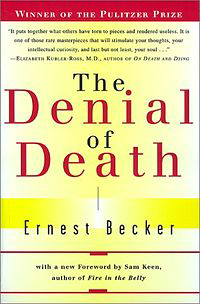Part of the Casswiki article series Books

The Denial of Death is a classic work by cultural anthropologist Ernest Becker, first published in 1973, which concerns the fact that the humanity is a symbolic defense mechanism against the knowledge of its mortality and, in turn, acts as the emotional and intellectual response to its basic survival mechanism. In short, the idea of death - the all-consuming fear of death - is the most basic motivation for human behavior. Due to the fact that the terror of death is so overwhelming, the human beings conspire to keep it unconscious and became the drive to “heroics” - to build a family, to create arts, to find “success” within society, to leave a “legacy”, et-cetera.
In the preface of his book, Becker writes:[1]
The prospect of death, Dr. Johnson said, wonderfully concentrates the mind. The main thesis of this book is that it does much more than that: the idea of death, the fear of it, haunts the human animal like nothing else; it is a mainspring of human activity - activity designed largely to avoid the fatality of death, to overcome it by denying in some way that it is the final destiny for man.
The noted anthropologist A.M. Hocart once argued that primitives were not bothered by the fear of death; that a sagacious sampling of anthropological evidence would show that death was, more often than not, accompanied by rejoicing and festivities; that death seemed to be an occasion for celebration rather than fear - much like the traditional Irish wake. Hocart wanted to dispel the notion that (compared to modern man) primitives were childish and frightened by reality; anthropologists have now largely accomplished this rehabilitation of the primitive. But this argument leaves untouched the fact that the fear of death is indeed a universal in the human condition. To be sure, primitives often celebrate death - as Hocart and others have shown - because they believe that death is the ultimate promotion, the final ritual elevation to the higher form of life, to the enjoyment of eternity in some form. Most modern Westerners have trouble believing this any more, which is what makes the fear of death so prominent a part of our psychological make-up.
This book and Becker’s 1975 Escape from Evil would ensure the reader to get a much better - and more accurate - idea of what really drives people.
Further information
See also
- Psychology
- Human condition
- Escape from Evil
- The Hero With a Thousand Faces
References
- ↑ Becker, Ernest. The Denial of Death, p. xvii. New York: Free Press Paperbacks, 1997
